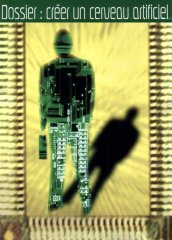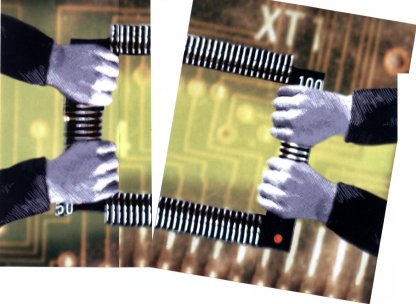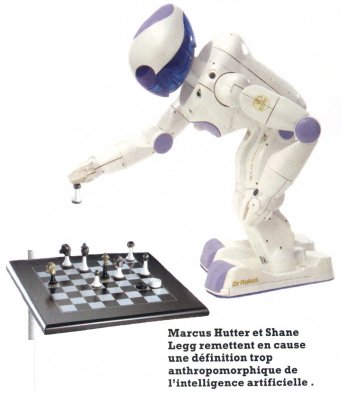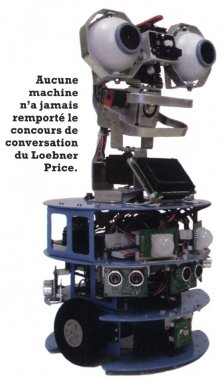Translated from journal: The World of Intelligence 1, november/december 2005, pages 43-45
Measuring the intelligence of a machine
 Marcus Hutter and Shane Legg defend a new method of measuring artificial
intelligence. To this day no other test has succeeded in doing this.
French Original by Cyril Fievet,
English translation by Philippa Hutter and Patricia Altermatt.
Marcus Hutter and Shane Legg defend a new method of measuring artificial
intelligence. To this day no other test has succeeded in doing this.
French Original by Cyril Fievet,
English translation by Philippa Hutter and Patricia Altermatt.
In 1905 the French psychologist Alfred Binet and his colleague Theodore
Simon gave birth to what is considered to be the first test of intelligence
in history. The "Binet-Simon" test, initially intended to measure the
intellectual maturity of children, developed into multiple versions,
inspired many other tests, and aroused serious controversy. Stemming from
debates over what is innate and what is acquired, and the influence of
culture in the development of an individual's intelligence, the limited
character of IQ tests has been greatly reproached. Moreover, these
inevitably simplistic scales of measurement poorly illuminate the principle
question: how to define intelligence? The revolution of new technologies
poses a new question: can artificial intelligence be compared to that of
humans?
Intelligence need not be defined only in the sense of human
intelligence
 Transposed to the world of machines, intelligence tests have until present,
either presented stumbling blocks or given place to new controversies. The
most well known among these tests, the Turing test, has for a long time been
the subject of virulent criticism, but has nevertheless given rise to a
fierce yearly competition that is followed with interest (see below).
In this context, proposing a new test of intelligence adapted to mechanical
and electronic systems is like attempting the impossible. This is however
what Marcus Hutter and Shane Legg, two researchers at the Dalle Molle
institute of Artificial Intelligence (IDSIA) in Switzerland, have done.
"One of the fundamental difficulties in artificial intelligence stems from
the fact that nobody really knows what intelligence is, in particular where
it concerns systems equipped with senses, environments, motivations, and
cognitive capacities that are different to our own", they write.
Transposed to the world of machines, intelligence tests have until present,
either presented stumbling blocks or given place to new controversies. The
most well known among these tests, the Turing test, has for a long time been
the subject of virulent criticism, but has nevertheless given rise to a
fierce yearly competition that is followed with interest (see below).
In this context, proposing a new test of intelligence adapted to mechanical
and electronic systems is like attempting the impossible. This is however
what Marcus Hutter and Shane Legg, two researchers at the Dalle Molle
institute of Artificial Intelligence (IDSIA) in Switzerland, have done.
"One of the fundamental difficulties in artificial intelligence stems from
the fact that nobody really knows what intelligence is, in particular where
it concerns systems equipped with senses, environments, motivations, and
cognitive capacities that are different to our own", they write.
Measuring the capacity of a machine to achieve its goals
 Hutter and Legg outline the various properties that play a role in this type
of intelligence: An entity called an "agent" interacts with a situation or
an external problem "the environment" of which it has only partial
knowledge. The ability of the agent to solve this problem supposes the
existence of a goal, all together allowing the postulation of an informal
definition of intelligence: "Intelligence measures the capacity of an agent
to reach these defined goals in a large class of environments."
The Swiss researchers then define a class of data and criteria designed to
formalize these principles. For example, a returning signal, called the
reward, measures the proximity of the agent to the goal it has been
assigned: The agent simply tries to maximize the level of reward that it
receives by learning the structure of the environment and by considering
what it must achieve in order to receive the highest reward.
The principle contribution of this theory is, without doubt, its great
flexibility. The model can be applied to all types of systems, in
particular, logical platforms or robotics equipped with diverse functions
(mobility, visual and voice recognition, etc.). Moreover, as Hutter and Legg
note, a very specialized system is penalized by this type of test. "The
chess computer IBM Deep Blue [which beat the official world champion in
1997, NDLR] would be inefficient outside of its very specific environment.
It would be rewarded with a very weak measure of universal intelligence.
This is compatible with our vision of intelligence as having a strong
ability to adapt", they continue.
"It is necessary to understand that we are not trying to define intelligence
in the human sense, but rather to consider intelligence as a more global
concept, of which human intelligence is a specific case", explains Shane
Legg.
Hutter and Legg outline the various properties that play a role in this type
of intelligence: An entity called an "agent" interacts with a situation or
an external problem "the environment" of which it has only partial
knowledge. The ability of the agent to solve this problem supposes the
existence of a goal, all together allowing the postulation of an informal
definition of intelligence: "Intelligence measures the capacity of an agent
to reach these defined goals in a large class of environments."
The Swiss researchers then define a class of data and criteria designed to
formalize these principles. For example, a returning signal, called the
reward, measures the proximity of the agent to the goal it has been
assigned: The agent simply tries to maximize the level of reward that it
receives by learning the structure of the environment and by considering
what it must achieve in order to receive the highest reward.
The principle contribution of this theory is, without doubt, its great
flexibility. The model can be applied to all types of systems, in
particular, logical platforms or robotics equipped with diverse functions
(mobility, visual and voice recognition, etc.). Moreover, as Hutter and Legg
note, a very specialized system is penalized by this type of test. "The
chess computer IBM Deep Blue [which beat the official world champion in
1997, NDLR] would be inefficient outside of its very specific environment.
It would be rewarded with a very weak measure of universal intelligence.
This is compatible with our vision of intelligence as having a strong
ability to adapt", they continue.
"It is necessary to understand that we are not trying to define intelligence
in the human sense, but rather to consider intelligence as a more global
concept, of which human intelligence is a specific case", explains Shane
Legg.
The success of the Legg-Hutter test would mark
a turning point in the world of research
For the moment, the aroused criticism regarding the principles of the test
seem weak. "Some believe one cannot define intelligence with a formula and
so conclude that our definition must be wrong. It is more a position of
principle rather than a specific criticism," states Shane Legg, who further
adds that in general the response to the test has been "very positive."
"Many wish there was a clean definition of non-anthropocentric
intelligence. It is surprising then that so few people have tried to define
what intelligence is for a machine."
In any case, a practical implementation of the Legg-Hutter test is awaited.
As Blay Whitby emphasized in the last August edition of New
Scientist, "There will be objections to this test, but it is a good
start." And to conclude, "arriving at a definition of intelligence that
functions for artificial intelligence might be one of the key points which
direct the future of this discipline.
The Turing Test
 Described in 1950 by the English mathematician, Alan Turing, the Turing test
is imperative in measuring levels of intelligence demonstrated by a machine.
The test assumes that if a human observer via an informal conversation
cannot determine with certainty that he is in the process of speaking with
an artificial entity, it must be considered intelligent. To this day, no
machine has successfully passed the Turing test, despite the Loebner
competition which has been held each year since 1991 and which offers a
100'000$ reward for a logical conversation capable of passing as human in
the eyes of an expert jury. The Loebner prize is based on the same principle
as the Turing test, however this approach has been highly criticized by
numerous specialists who believe that it rests on an overly limited and
anthropocentric vision of the notion of intelligence: A machine capable of
passing the Turing test would not therefore be intelligent, on the contrary,
many say that a machine could be intelligent without being capable of
expressing itself like a human being.
Described in 1950 by the English mathematician, Alan Turing, the Turing test
is imperative in measuring levels of intelligence demonstrated by a machine.
The test assumes that if a human observer via an informal conversation
cannot determine with certainty that he is in the process of speaking with
an artificial entity, it must be considered intelligent. To this day, no
machine has successfully passed the Turing test, despite the Loebner
competition which has been held each year since 1991 and which offers a
100'000$ reward for a logical conversation capable of passing as human in
the eyes of an expert jury. The Loebner prize is based on the same principle
as the Turing test, however this approach has been highly criticized by
numerous specialists who believe that it rests on an overly limited and
anthropocentric vision of the notion of intelligence: A machine capable of
passing the Turing test would not therefore be intelligent, on the contrary,
many say that a machine could be intelligent without being capable of
expressing itself like a human being.
For more information see ...
| © 2000 by ... |
|
... Marcus Hutter |
 Marcus Hutter and Shane Legg defend a new method of measuring artificial
intelligence. To this day no other test has succeeded in doing this.
French Original by Cyril Fievet,
English translation by Philippa Hutter and Patricia Altermatt.
Marcus Hutter and Shane Legg defend a new method of measuring artificial
intelligence. To this day no other test has succeeded in doing this.
French Original by Cyril Fievet,
English translation by Philippa Hutter and Patricia Altermatt.
 Transposed to the world of machines, intelligence tests have until present,
either presented stumbling blocks or given place to new controversies. The
most well known among these tests, the Turing test, has for a long time been
the subject of virulent criticism, but has nevertheless given rise to a
fierce yearly competition that is followed with interest (see below).
In this context, proposing a new test of intelligence adapted to mechanical
and electronic systems is like attempting the impossible. This is however
what Marcus Hutter and Shane Legg, two researchers at the Dalle Molle
institute of Artificial Intelligence (IDSIA) in Switzerland, have done.
"One of the fundamental difficulties in artificial intelligence stems from
the fact that nobody really knows what intelligence is, in particular where
it concerns systems equipped with senses, environments, motivations, and
cognitive capacities that are different to our own", they write.
Transposed to the world of machines, intelligence tests have until present,
either presented stumbling blocks or given place to new controversies. The
most well known among these tests, the Turing test, has for a long time been
the subject of virulent criticism, but has nevertheless given rise to a
fierce yearly competition that is followed with interest (see below).
In this context, proposing a new test of intelligence adapted to mechanical
and electronic systems is like attempting the impossible. This is however
what Marcus Hutter and Shane Legg, two researchers at the Dalle Molle
institute of Artificial Intelligence (IDSIA) in Switzerland, have done.
"One of the fundamental difficulties in artificial intelligence stems from
the fact that nobody really knows what intelligence is, in particular where
it concerns systems equipped with senses, environments, motivations, and
cognitive capacities that are different to our own", they write.
 Hutter and Legg outline the various properties that play a role in this type
of intelligence: An entity called an "agent" interacts with a situation or
an external problem "the environment" of which it has only partial
knowledge. The ability of the agent to solve this problem supposes the
existence of a goal, all together allowing the postulation of an informal
definition of intelligence: "Intelligence measures the capacity of an agent
to reach these defined goals in a large class of environments."
The Swiss researchers then define a class of data and criteria designed to
formalize these principles. For example, a returning signal, called the
reward, measures the proximity of the agent to the goal it has been
assigned: The agent simply tries to maximize the level of reward that it
receives by learning the structure of the environment and by considering
what it must achieve in order to receive the highest reward.
The principle contribution of this theory is, without doubt, its great
flexibility. The model can be applied to all types of systems, in
particular, logical platforms or robotics equipped with diverse functions
(mobility, visual and voice recognition, etc.). Moreover, as Hutter and Legg
note, a very specialized system is penalized by this type of test. "The
chess computer IBM Deep Blue [which beat the official world champion in
1997, NDLR] would be inefficient outside of its very specific environment.
It would be rewarded with a very weak measure of universal intelligence.
This is compatible with our vision of intelligence as having a strong
ability to adapt", they continue.
"It is necessary to understand that we are not trying to define intelligence
in the human sense, but rather to consider intelligence as a more global
concept, of which human intelligence is a specific case", explains Shane
Legg.
Hutter and Legg outline the various properties that play a role in this type
of intelligence: An entity called an "agent" interacts with a situation or
an external problem "the environment" of which it has only partial
knowledge. The ability of the agent to solve this problem supposes the
existence of a goal, all together allowing the postulation of an informal
definition of intelligence: "Intelligence measures the capacity of an agent
to reach these defined goals in a large class of environments."
The Swiss researchers then define a class of data and criteria designed to
formalize these principles. For example, a returning signal, called the
reward, measures the proximity of the agent to the goal it has been
assigned: The agent simply tries to maximize the level of reward that it
receives by learning the structure of the environment and by considering
what it must achieve in order to receive the highest reward.
The principle contribution of this theory is, without doubt, its great
flexibility. The model can be applied to all types of systems, in
particular, logical platforms or robotics equipped with diverse functions
(mobility, visual and voice recognition, etc.). Moreover, as Hutter and Legg
note, a very specialized system is penalized by this type of test. "The
chess computer IBM Deep Blue [which beat the official world champion in
1997, NDLR] would be inefficient outside of its very specific environment.
It would be rewarded with a very weak measure of universal intelligence.
This is compatible with our vision of intelligence as having a strong
ability to adapt", they continue.
"It is necessary to understand that we are not trying to define intelligence
in the human sense, but rather to consider intelligence as a more global
concept, of which human intelligence is a specific case", explains Shane
Legg.
 Described in 1950 by the English mathematician, Alan Turing, the Turing test
is imperative in measuring levels of intelligence demonstrated by a machine.
The test assumes that if a human observer via an informal conversation
cannot determine with certainty that he is in the process of speaking with
an artificial entity, it must be considered intelligent. To this day, no
machine has successfully passed the Turing test, despite the Loebner
competition which has been held each year since 1991 and which offers a
100'000$ reward for a logical conversation capable of passing as human in
the eyes of an expert jury. The Loebner prize is based on the same principle
as the Turing test, however this approach has been highly criticized by
numerous specialists who believe that it rests on an overly limited and
anthropocentric vision of the notion of intelligence: A machine capable of
passing the Turing test would not therefore be intelligent, on the contrary,
many say that a machine could be intelligent without being capable of
expressing itself like a human being.
Described in 1950 by the English mathematician, Alan Turing, the Turing test
is imperative in measuring levels of intelligence demonstrated by a machine.
The test assumes that if a human observer via an informal conversation
cannot determine with certainty that he is in the process of speaking with
an artificial entity, it must be considered intelligent. To this day, no
machine has successfully passed the Turing test, despite the Loebner
competition which has been held each year since 1991 and which offers a
100'000$ reward for a logical conversation capable of passing as human in
the eyes of an expert jury. The Loebner prize is based on the same principle
as the Turing test, however this approach has been highly criticized by
numerous specialists who believe that it rests on an overly limited and
anthropocentric vision of the notion of intelligence: A machine capable of
passing the Turing test would not therefore be intelligent, on the contrary,
many say that a machine could be intelligent without being capable of
expressing itself like a human being.